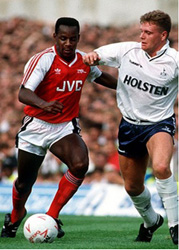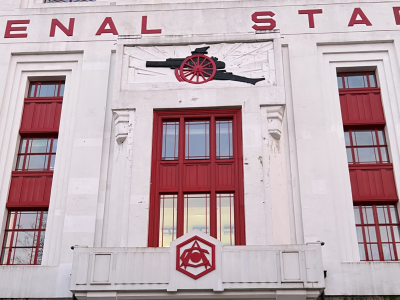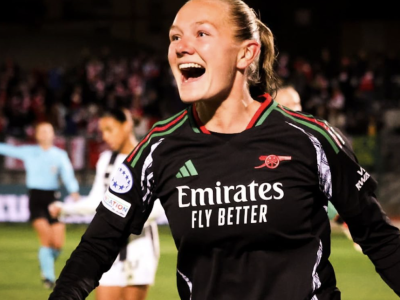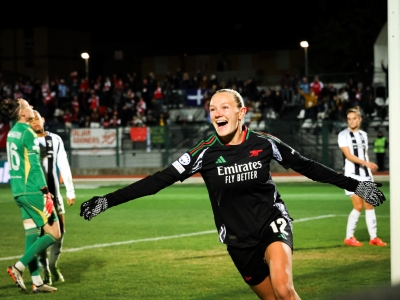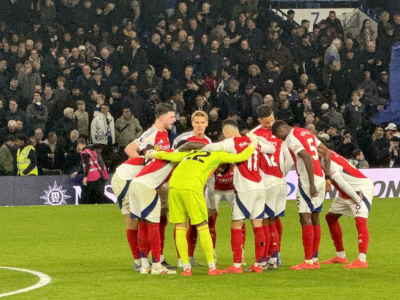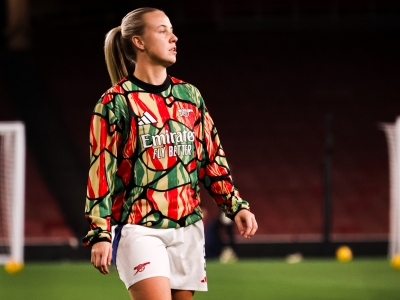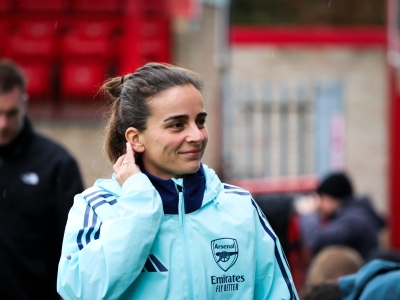Flashbacks for Tottenham at home can be found here and here, while yesterday’s edition can be found here
George Graham’s first season at Arsenal is generally considered a success, however people are quick to forget that Arsenal only won two of his first eight games in charge. After a 0-1 away to Nottingham Forest, the corner was turned at the start of October and there followed a seventeen game unbeaten run - which included thirteen victories with thirty one goals scored along the way – that took Arsenal to the top of table. The zenith of this run of form, which formed the basis of the George Graham era, came on Sunday 4th January 1987 away to Tottenham at White Hart Lane, shown live on Match of the Day on the BBC.
Spurs, in their first season under the management of David Pleat were not doing too badly that season either, fired on by former Arsenal striker (albeit for an extremely brief period) Clive Allen during an ‘annus miribulus’ season for him which saw him score forty nine goals in all competitions – a record number of goals for a Spurs player in one season, beating the previous record set in the sixties by Jimmy Greaves. At the time of North London Derby however, Spurs were as much as ten points behind Arsenal.
The Gunners took the lead with a goal from Tony Adams and just ahead of half time Tottenham’s Danny Thomas brought down Martin Hayes when through on goal (which would now be a straight red), Paul Davis however scored direct from the resulting free kick. Mitchell Thomas pulled one back for Spurs, but Arsenal held out for a 2-1 win which put them four points clear at the top of the old First Division. This however would be Arsenal’s last League win for the next eleven matches, unable to secure another League victory until early April. In the meantime, Arsenal were proceeding in both cups and had drawn Tottenham Hotspur in the Semi Final of the League Cup.
Arsenal had gone a goal down in the first leg at Highbury to an offside Clive Allen goal. Three weeks on back at White Hart Lane, Arsenal looked doomed after a first half goal for Clive Allen doubled Tottenham’s lead after a goalkeeping blunder from John Lukic. The PA announcer at White Hart Lane certainly thought so after announcing details of how to book tickets for the final during the half time break, Which George Graham used to fire up his troops for the second half. Arsenal got back into the game after a long David Rocastle throw had been headed on by Niall Quinn and bundled over the line by Viv Anderson. Rocky would be involved again crossing for Niall Quinn to finish off as Arsenal drew level on aggregate, 2-1 on the day and into extra time.
In these days before penalty shoot outs decided ties, with no further score it would be back to White Hart Lane for the replay three days on. Arsenal would look doomed again after Clive Allen put Spurs ahead late on, with Charlie Nicholas hobbling off injured and replaced by Ian Allinson who had been side-lined for most of the season. One of his first touches of the ball had been receiving a long pass from Paul Davis which he was unable to hit first time. With Spurs’s Richard Gough tracking back, Allinson managed to squeeze the ball between his legs and past Ray Clemence in the Tottenham goal by the tightest of angles to bring Arsenal back in it. There was just enough time left for David Rocastle to collect the rebound from an Ian Allison shot to put the ball past Ray Clemence for the winner and send the Arsenal away support ecstatic.
The mantra which emerged from these series of games had been ‘one nil down, two one up’, which a rival fanzine to The Gooner appropriated for its title. Another lesser known fact is that back in early 1987, Tottenham Hotspur used to advertise tickets for games on LBC sport with the narrator’s opening line: ‘Did you know that Spurs are still in with a chance of doing the treble?’ – an advert that thankfully disappeared overnight. Tottenham’s dreams of the treble proved over optimistic as Spurs ended the season trophy-less, although finished one place above Arsenal in third. The mantra of ‘One Nil Down, Two One Up’ continued into the next season, as Arsenal won their fourth game by that score line at White Hart Lane in the calendar year of 1987.
Just three days on from the famous hurricane in October of that year, Arsenal’s visit to White Hart Lane would be shown live on ITV’s ‘The Big Match’ on a Sunday afternoon. Spurs opened the scoring with a goal from one of the few foreign internationals playing top flight English football at the time – Belgium’s Nico Clausen. Arsenal however stormed back with goals from David Rocastle and Michael Thomas to win 2-1, while Steve Williams won praise for his performance (here telling Ossie Ardiles to ‘go away’ – or words to that effect).
Another fact about this game is that it would be the final game for Tottenham under David Pleat’s first reign as Tottenham manager, who resigned a week later after embarrassing revelations about his private life. Just before the Arsenal game, Spurs were third in the table but there followed a run of ten games without win which included eight defeats which sunk Spurs to thirteenth in the table. Mid-way through that run, Tottenham brought in Terry Venables as boss after he was sacked from his job with Barcelona after a poor start to the season, which saw the beginning of an era where old pals George Graham and Terry Venables battled for North London supremacy.
In his first season however Venables suffered a 1-2 defeat in the third round of the FA Cup to Port Vale and finished thirteenth in the League. In the close season of 1988, Spurs allowed Venables to splash the cash by breaking the British transfer record to sign Paul Gascoigne from Newcastle for £2 million, as well as Paul Stewart from Man City while Arsenal signed only Steve Bould as a reserve Centre Half. The Gunners would meet Spurs in the Wembley International Tournament just ahead of the season. Tottenham’s opening fixture of the 1988/89 season against Coventry however was called off due to over running building work on White Hart Lane’s East Stand, which meant that Paul Gascoigne’s first home game at White Hart Lane would be against Arsenal.
Arsenal’s good run over Spurs continued with a fifth straight win at White Hart Lane with a 3-2 victory secured with goals from Brian Marwood, Alan Smith and Brian Marwood, while on the scores sheet for Spurs would be Chris Waddle and a first Tottenham goal for Paul Gascoigne who lost his boot in the process of scoring. It would however turn out to be Arsenal’s last victory over Spurs at White Hart Lane for the next four years. While Arsenal were on their way to a first title for eighteen years, Spurs would win only one of their first ten games during a run of games that would include a 2-2 draw with Man United and a 1-3 defeat to Derby with Bobby Mimms having a howler conceding two goals to Ted McMinn, who in the years since has suffered a leg amputation.
The latter defeat left Spurs rock bottom of the table at the start of the November, however a strong finish to the season in which Spurs lost just three of their last fifteen fixtures, including a 5-0 win over early season challengers Millwall at the Den, meant Spurs finished in sixth place. The following season, Spurs got off to another bad start, winning just one of their first five games, though had moved up to eighth by the time second placed Arsenal visited White Hart Lane in mid-November. Spurs however managed their first home win over Arsenal during the George Graham era, as goals from Vinny Samways and Paul Walsh gave Spurs a 2-1 win, while Michael Thomas pulled one back for the Gunners.
A late run of eight wins out of their last ten games took Spurs one place above Arsenal in the table to third place. England also reached the Semi Final of the World Cup with both Paul Gascoigne and Gary Lineker playing a prominent role and Spurs went the first ten games of the 1990/91 season unbeaten, which took them to third behind Arsenal and Liverpool, before the latter ended their run with a 3-1 win at White Hart Lane. Spurs however had dropped off the pace by the time of Arsenal’s visit to White Hart Lane. A 0-0 draw stretched Arsenal’s unbeaten run to twenty two games – a run which last just one more game as three weeks later Chelsea inflicted Arsenal’s only league defeat of the season on their way to the League title, though Spurs would prevent Arsenal from a double after beating the Gunners in Wembley’s first Semi-Final.
In 1991/92, Arsenal visited Tottenham in late February a week after a 7-1 win over Sheffield Wednesday after a run of just one win in ten games, which saw Arsenal’s season collapse. Arsenal were facing another defeat after a Paul Stewart goal, however Ian Wright grabbed a last minute equaliser in a 1-1 draw. One season on, Arsenal’s first visit to White Hart Lane during the Premiership era saw Arsenal https://www.youtube.com/watch?v=4uAIrmDL2oM target="_blank">lose 0-1 to a goal from Paul Allen (revenge for Willie Young’s foul twelve years earlier no doubt). In this game Ian Wright also punched David Howells off of the ball, which led to the former receiving a suspension. The following August however, Ian Wright would go from villain to hero by scoring in the last minute to secure a 1-0 win over Spurs.
In 1994/95, Spurs started the season with a 4-3 win over Sheffield Wednesday at Hillsborough having spent big money over the summer buying Jurgen Klinsmann (who signed from Monaco, then under the management of Arsene Wenger) and Gheorghe Popescu. When Arsenal visited White Hart Lane on 2nd December, a goal from the latter inflicted a 0-1 defeat on the Gunners with Tottenham on course for their last ever League finish above Arsenal in seventh, while Arsenal finished twelfth. The following season Arsenal also crashed to a 1-2 defeat after taking the lead through a magnificent Dennis Bergkamp volley, however goals from Teddy Sheringham and Chris Armstrong meant a 1-2 defeat for the Gunners.
The first ever visit to White Hart Lane during the reign of Arsene Wenger ended in a 0-0 draw. During Wenger’s first double season, Arsenal visited White Hart Lane between the interim of Christmas and New Year with a Ray Parlour goal cancelling out an earlier Alan Neilsen strike, for a 1-1 draw, a result which left Arsenal twelve points off of League leaders Man United in sixth place – a deficit which Arsenal gradually clawed back to overhaul United. Arsenal’s first win at White Hart Lane during the Wenger years came in May 1999. Arsenal went into this game one point ahead of United, who had one game in hand over Arsenal.
Spurs now had former Arsenal boss George Graham in charge, which left the Spurs fan base as divided as Arsenal’s in the present day over Arsene Wenger. The Gunners achieved their first away win over Tottenham for six years as goals from Emmanuel Petit, Nicolas Anelka and Nwankwo Kanu gave Arsenal a 3-1 win, their fifth straight victory. Manchester United meanwhile dropped a point at Anfield that same night with a 2-2 draw, which gave Arsenal a three point cushion at the top. United however won their next game with a 1-0 win away at Middlesbrough. Forty eight hours on however saw Arsenal crash to a 0-1 defeat at Leeds United,, while a 0-0 draw for United which relegated Blackburn meant that Arsenal were going into the final game of the season reliant on George Graham’s Spurs preventing Man United from winning at Old Trafford.
Spurs took the lead with a goal from Les Ferdinand, however an equaliser from David Beckham and second half goal for Andy Cole gave Man United a 2-1 win and the 1998/99 Premiership title. The following season, Spurs won the final North London Derby of the twentieth century in November 1999, inflicting a 1-2 defeat on Arsenal with goals from Stefan Iversen and Tim Sherwood, while Patrick Vieira was on target for Arsenal. That defeat would be Arsenal’s last to Tottenham for nearly a decade, however victories at White Hart Lane would still be hard to come by for Arsenal.
There would follow four straight draws, with three consecutive 1-1 draws. In December 2000 Spurs took the lead with a goal from Sergei Rebrov, however Arsenal prevented a Tottenham win with a late equaliser from Patrick Vieira. It would be after this game that Alan Sugar quit as Spurs Chairman. On taking over at Spurs the club were going bankrupt, but on his exit were financially solvent. Despite that, Spurs were the only top flight club whose average attendance dropped in the first ten years after the formation of the Premiership compared to the Pre-Premiership years.
In that December 2000 fixture, Robert Pires got a ball in the face from angry Spurs fan, however got his own back by becoming one of Tottenham’s chief tormentors. In November 2001, Pires gave Arsenal the lead with a superb thirty yard strike, however an equally superb volley from Gus Poyet secured a draw. A week before Christmas 2002, Christian Ziege gave Spurs the lead, however Robert Pires popped up again to slot away an equalising penalty.

